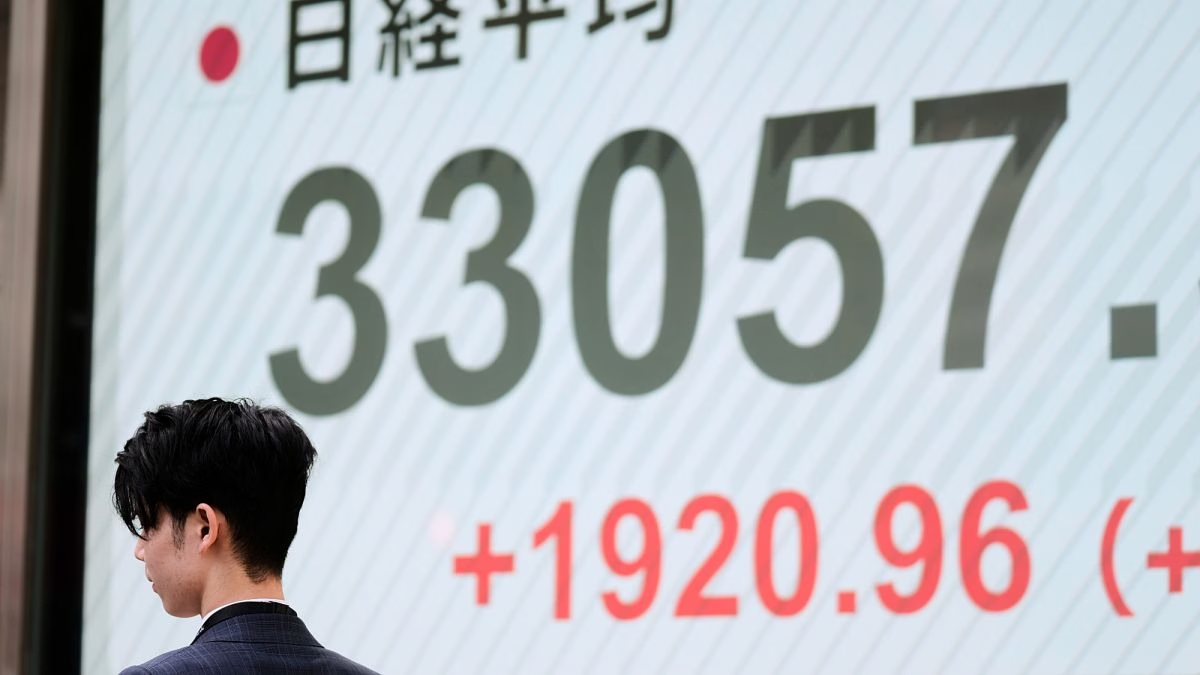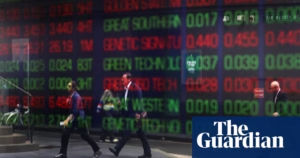As investors anticipate the opening of European markets, the situation in the Asia-Pacific region overnight presented a stark contrast to Monday’s turmoil.
However, markets in Thailand and Indonesia experienced significant declines as they reopened following holidays. Trading was temporarily halted in Jakarta when the JSX index plummeted by more than 9%, ultimately settling at a 7.5% decline by midday. Similarly, Thailand’s SET suffered a 5.7% loss.
In Taiwan, the Taiex index plummeted by 4.4%, largely influenced by significant losses incurred by Taiwan Semiconductor Manufacturing Corp., or TSMC, the world’s leading computer chip manufacturer. TSMC’s shares fell by 4% on Tuesday and have declined by 13.5% since President Trump announced his “Liberation Day” tariffs on April 2.
A rebound was observed in most other regional markets, following an eventful day on Wall Street where stocks fluctuated wildly in response to President Donald Trump’s threats of escalating his double-digit tariffs.
China’s Commerce Ministry announced early Tuesday that it would “fight to the end” and implement unspecified retaliatory measures against the United States to safeguard its interests, after President Donald Trump threatened to impose an additional 50% tariff on Chinese imports.
By early afternoon in Tokyo, the Nikkei 225 had surged by 5% to reach 32,691.34.
Hong Kong also witnessed some recovery, although it fell short of regaining the 13.2% loss experienced on Monday, which constituted its worst day since the Asian financial crisis in 1997.
The Hang Seng index achieved a 1.6% gain to 20,140.78, while the Shanghai Composite index advanced by 0.9% to 3,124.77.
South Korea’s Kospi and the S&P/ASX 200 also experienced modest gains, with Kospi inching up by 0.1% to 2,331.80 and S&P/ASX 200 climbing 1.7% to 7,471.10. Markets in New Zealand and Australia also showed positive trends.
Investors Await Trump’s Next Move
On Monday, the S&P 500 faltered by 0.2% as investors, reeling from the recent events, kept a close eye on President Trump’s subsequent actions in the ongoing trade war. If countries agree to trade deals, tariffs could be lowered, potentially avoiding a recession. However, if tariffs persist, stock prices might plummet further.
The Dow Jones Industrial Average plummeted by 349 points, or 0.9%, and the Nasdaq composite index edged up by 0.1%.
All three indexes commenced the day with sharp declines, with the Dow plummeting as much as 1,700 points due to dire losses globally. Nevertheless, it made an unexpected surge to a gain of nearly 900 points in the late morning. The S&P 500 index experienced a swing from a 4.7% loss to a leap of 3.4%, which would have been its most substantial jump in years.
The fluctuation followed a false rumor that Trump was considering a 90-day pause on his tariffs, which a White House account on X dismissed as “fake news.” The fact that such a rumor could affect trillions of dollars’ worth of investments underscores investors’ desire to see signs that Trump may ease up on tariffs.
Stocks soon turned lower again. Shortly afterward, Trump dug in further and threatened to increase tariffs against China following its own set of tariffs on US products last week.
Trump expressed his intention to bring factory jobs back to the United States, a process that could take years. He also emphasized his goal of reducing trade deficits with other countries, although the room for negotiation on this matter remains unclear.
Indexes Swing Between Gains and Losses
Indexes experienced significant fluctuations between losses and gains on Monday, largely due to investors’ lingering hope that negotiations could prevent the implementation of strict duties on all imports.
The only certainty amid the turmoil is the financial distress inflicted on investments worldwide.
Oil prices have also fallen amid concerns that a global economy weakened by trade barriers will consume less fuel. A barrel of benchmark US crude oil dropped below $60 on Monday for the first time since 2021. By early Tuesday, it had increased by 90 cents to $61.60 per barrel.
Brent crude, the international standard, gained 89 cents to $65.10 per barrel.
In currency trading, the US dollar sank to 147.78 Japanese yen from 147.85 yen. The euro fell to $1.0976 from $1.0905.
The price of gold surged by $32 to approximately $3,006.00 an ounce.
Bitcoin spiked by 4.1% to $80,130.00. On Monday, it plummeted below $79,000, down from its January record above $100,000.




